Crews
Wild Colonial Boys
Shortly after Wing Commander Martin's arrival at Breighton, two police constables called on him to devise some way of overcoming the disappearance of push bikes from outside the Black Swan (Dirty Duck) and the Seven Sisters (the fourteen Titties) at closing time, only to be picked up by the rightful owners outside the main gate into the station next morning.
After a long discussion, at which general agreement was reached that everything must be done to stop this wanton pilfering, and the Air Force bikes would be painted all white, the two constables were shown to the door, beside which their bikes had been stood. But alas their journey had been in vain, both bikes had vanished!!
The other story concerned six or seven of the boys riding their bikes back to Breighton after a night out in Goole, and a steam roller they came across parked on the side of the road. They decided it would be a fitting ornament for the mess.
The crew of Ron Whitney, Bob Appleton, "Digger" Hammett, and Sydney "Mick" McGrory, bomb aimer who claimed as he was always up the front in a Lancaster, he would ride shot gun to the rear insisting he was the rear gunner, didn't feel like walking home so "borrowed" the steam roller. They climbed aboard, threw some coal into the fire box, and, after some pushing and pulling of levers, the monster began to move. As there was no mutual agreement who would drive, whenever one pulled a laver the other automatically pushed one, consequently a rather erratic course along the road was set. However, a small crowd of bystanders had by this time gathered to watch the spectacle and, with plenty of encouragement being given, they pursued a course for Base, traveling at a speed which is not normally expected or required of a steam roller. They drove it for some distance and about a mile short of their destination they took a dive to port, off the road, over a ditch, and through a hedge where the machine stopped and despite much coaxing, the crews were unable to restart it and reluctantly they abandoned ship. The following morning we just couldn't remember where we had left it. All we did know was we had not shut the thing off so, if it had managed to build up any more steam, it would have gone off on its own. So when we took off on an exercise, we flew round a bit to see if we could spot it. But there was no sign of that steamroller. I still have visions of it in a ditch bottom!" and the incident was almost forgotten until about five days later, when all aircrew were summoned to the briefing room where a harassed C.O., Wing Commander Kaufmann, asked if any of the assembly either thieved, borrowed or left a steam roller somewhere between Goole and Breighton. After some indecision one of the culprits volunteered the information that there was one parked in a hedge about a mile down the road. The local Council were duly notified and that steam roller was seen in action again on the same stretch of road, but when not in use the controls were always carefully padlocked. On another occasion after quite a few drinks they decided to ride back from Home on Spalding in formation with one being the Jerry fighter attacking from the rear. Suddenly up front the local policeman stepped out into the middle of the road and stopped them. He gave them half an hour to be clear of Bubworth but according to Mick McGrory they convinced him to have a drink with them. It ended up they borrowed the cop's helmet and gave him a party cap. By this time even the cop was under the weather so they had him standing in the middle of the street while they rode on their bikes in an attack on him. At the last minute they split each time and passed down each side of him.
And so incidents such as these lightened the men's burden and gave them happy memories of that beautiful section of the English countryside and, together with the many friendships they formed with the local people, they had plenty of regrets when the time of departure finally arrived.
When it came to unwinding when there were no ops, the Australians at Binbrook took some beating.
Their wild parties became something of a legend, a legend which is still discussed today by people in the Binbrook area who were around in those last two years of the war.
There was the time they "liberated" a donkey from the Marquis of Granby in Binbrook and decided to paint it air force blue
On another occasion, the sergeant's mess was turned into an impromptu polo arena; cycles were horses, brushes mallets, and for a ball they used a tea cup. The following day there wasn't a surviving cup in the mess.
Some members of his crew were noted for their high spirits. One carried a Buntline Special revolver tucked into his flying boots "just in case". After one raid, they had to divert to an East Anglian base being used by the Americans and were billeted in a large Nissen hut with 40 or 50 other men. When they were all in bed an argument started about whose job it was to switch out the light. The Aussie ended it by shooting out the light bulb, the light fitting and about six square inches of roof with his pistol.
The piano in the sergeant's mess needed replacing at least once a fortnight because of the amount of beer poured into it and George Toombs remembers his pilot, Pilot Officer Lester, being reprimanded for injuring a tramp one day ‑ with the slipstream of his Lancaster. Lester and his best friend often used to format on their way back to Binbrook and indulge in a little low flying over Lincolnshire. One day he just heaved his bomber clear of a haystack in a field and the rear gunner shouted with glee as the stack disintegrated. Back at base the pilot was ticked off because it seemed the stack contained a few sleeping tramps, one of whom broke a leg when he was suddenly blown 20 yards in the field.
On another occasion Mr Toombs remembers one of the crew sleeping off a heavy night in the mess when it was decided to give him a surprise. His bed was carried gently out of the house the crew shared ‑ the sleeping airman blissfully unaware of what was happening ‑ and left at the end of the runway where Lancasters were thundering over every few minutes. He only woke up when it started to rain.
Lester's crew survived to complete a tour of ops, although the fates were kind to them on a number on occasions. They had an engine fire after being hit by flak on their third trip over Stuttgart and on another occasion were narrowly missed by the bombs of a Lancaster they spotted just 200 feet above them.
But their worst moment came over the Wash when they were returning from a raid. The mid upper gunner was leaving his turret when he accidentally trod on the aileron cables. The aircraft was at 18,000 feet and suddenly went into a power dive. The pilot and most of the crew were not strapped in and for a few seconds were pinned to the roof of the diving aircraft. One of the front Browning machine guns flew out of its mounting and went through the cockpit canopy. The pilot tried to order the crew to bale out but his intercom connection had been pulled out. He finally managed to bring the aircraft under control by using his foot on the aileron wheel when they were down to just 6,000 feet. When they arrived back at Binbrook it was discovered the force of the dive had bent the wings while the prop blades were deeply pitted. The aircraft was later struck off charge as unairworthy and a few choice words were said to the mid‑upper gunner.
Lester's crew had N‑Nan as their aircraft on 12 of their 30 trips. She was a fine aircraft but had one engine which constantly and mysteriously failed to produce the same amount of revs as the other three. One day they were taking off with a full load and had to use the short runway, striking off from their dispersal to give themselves more room.
"I thought it was going to be a dicey one," said Mr Toombs. "It was taking an age to get in the air and right in front of us was the spare aircraft with the crew already on board. They saw what was happening and jumped out and scarpered. "
All this time the rear gunner, "Fingers" Dowse, was happily singing away in his turret as he did at the start of every trip. Lester finally hauled N‑Nan off the runway and ordered Toombs to pull up the wheels straight away. By doing this they just scraped over the spare Lane. "Jesus ‑ that was close!" came the cry from the rear turret.
Another hairy moment came when a low‑level sortie over the Bay of Biscay resulted in a Lancaster close to N‑Nan being caught in the slipstream of an aircraft ahead and flipping over and disappearing in the sea within seconds. On other occasions the Australians found themselves being fired on by trawlers in the Humber minutes after they had taken off.
Mr Toombs remembers Group Captain Hughie Edwards, the station commander, as a "fine, brave" man who would often fly with new crews and would insist on circling the target to give them more experience. He was always on hand at briefings to give out advice, but despite all his experience, he never really mastered landing a Lancaster. "We would all turn out to watch him land and there were a lot of comments about him flying on kangaroo juice!"
He recalls one daylight raid when 460 was chosen to lead the whole of Bomber Command. Edwards, Air Commodore Wray and the squadron CO each had the tails of their aircraft painted with bright yellow bands and led the entire bomber stream in immaculate formation. Then the flak started and bombers began peeling away like fighters. But not the three leaders from Binbrook. They maintained their tight formation and gradually the other aircraft fell in behind them.
"That epitomized the men at the top at Binbrook," said Mr Toombs. "They were brilliant leaders."
Keith Teasdale was a Londoner who served as a flight engineer in an otherwise all‑Australian crew at Binbrook in the closing stages of the war.
He has particular cause to remember Air Commodore Wray for one day he flew with them on a cross country exercise to Millom in Cumberland. On the way there the front turret's hydraulic system developed a leak and this led to oil covering the windscreen. Undeterred, Hoppy Wray opened the small slot in the comer of the windscreen and, peering through this, made a perfect landing on an airfield he had never seen before. "He was a first‑class pilot," said Mr Teasdale, who now lives in Peterborough.
He spent a very happy spell at Binbrook, "a great station in those days", and even though he was the only Englishman in the crew, never felt out of tune with his Aussie counterparts.
"The only difference was that they got paid more than we did. There was only one other sergeant in the crew but their arrangement was they would be paid in English currency but at the Australian rate. This meant that while I was getting 18s 6d a day, he was getting at least 24 bob. But we didn't let little things like that come between us!"
Once at Binbrook, the whole crew quickly began to discover the delights of nearby Grimsby. They all had their portraits taken by Sid Burton at his studio in Abbey Road, Grimsby, and had many a good night at the Mucky Duck and the old Black Swan, a popular haunt for aircrew from at least half a dozen I Group stations in the area.
Returning at all hours any bike would do so the local policeman was kept busy with reports of stolen bikes. Thinking to stop the bike stealing he rode to Binbrook and called on the station adjutant requesting the aircrew be straightened out and the stealing or borrowing of bikes cease. Feeling he had got the message across he prepared to leave and when he got outside lo and behold his bike stolen.
At the Cafe Dansant on the seafront at Cleethorpes, where there were ATS and Waaf girls to dance with, but very few of the much‑prized Wrens from the naval base in Grimsby.
His route home was on the train via Boston and Peterborough, a service well used by the Royal Air Force, and Mr Teasdale can still recall his journeys on the 5.30am Peterborough‑Grimsby Town train and then the last leg on the wooden‑seated bus up to Binbrook, where he could arrive just in time for breakfast.
"One of 460's Lancasters at the time carried a neat sign on the fuselage by the Elsan chemical toilet. By courtesy of LNER, it read 'Do not pull the chain while the train is standing in the station', below which was added 'Except over enemy territory'!"
The Yarborough Hotel in Grimsby was a popular spot to eat, particularly as there seemed to be an inexhaustible supply of chicken. One night they ordered a lobster for one of the crew, who hailed from the Alice Springs area of Australia. He had never seen the sea before he left for England, let alone a lobster. "It took him all night to eat it," recalled Mr Teasdale.
"The same man had never seen snow before he came to Binbrook and we would often see him going to the window and just looking at it fall when he thought we weren't watching. But a few days of digging the stuff off the runway soon cured him of any liking for snow."
There was a very strong affinity with the ground crews at Binbrook and during that bad winter of early 1945 when Binbrook was cut off for a time, food was rationed. Milk was in short supply and a notice went up in the sergeant's mess one day that only those on flying duties would be entitled to milk. For the next three days no one touched a single drop of milk and every chum was returned unopened until the notice was taken down.
Mr Teasdale's crew was allocated F‑Fox and their first pilot was the squadron commander. He did not fly very often, but when he did he made sure they were always the longest and hardest trips. The rest of the time they were the "spare bods". They had to prepare for each raid but only flew if someone else dropped out. The nervous strain on them was considerable as they never knew until the last minute whether they would be operating. On one occasion Keith Teasdale had to run across the airfield to join a Lancaster which was already running up its engines when its own engineer went sick. On another, their navigator returned from a raid badly burned.
Later they did get their own pilot, Alex Jenkins, who had been the sole survivor of a Lancaster shot down over Belgium, and they were to complete the war with him in the driving seat.
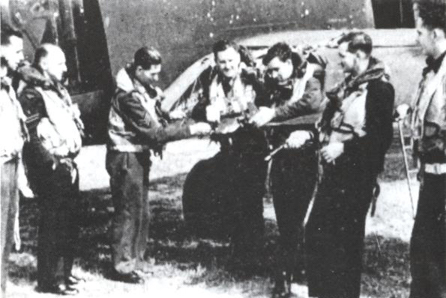
F-Sgt. Danny Rees' crew with their aircraft showing some of the damage to it after the Peenemunde raid. From left to right: Sgt. R. Townshend, DFM, F-Sgt. J. Parker; Sgt. S. Rolfe, DFM; F-Sgt. J. Venning, DFM; Sgt. C. Harris; F-Sgt. J Quaite, DFM; F-Sgt D. Rees, CGM.
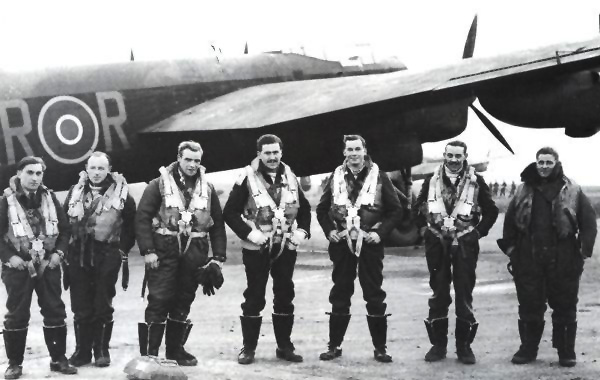
F-Lt. Eric Corser, DFC, third from the right, and his crew before take-off.
Press on Regardless
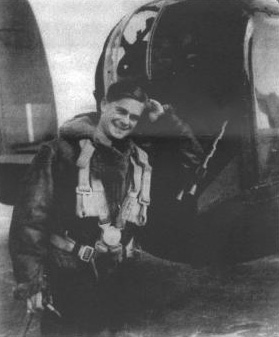
Robert Dunstan beside the read turrest of a Lancaster in September, 1943.
Dunstan, who had made 22 trips over enemy territory when this photo was take, was the only one-legged rear gunner in the RAAF. He lost his leg with the Army in the Middle East early in 1942 and once back in Australia, he volunteered for the RAAF and was back in uniform by June 1942. Robert Dunstan completed a tour of 30 ops on 460, mainly with John Clark, DFC and bar.
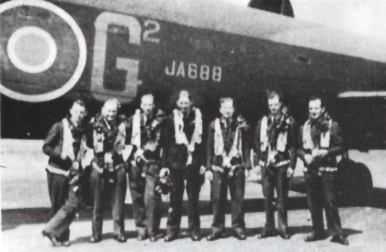
F-Sgt. L. J. (Mick) Christensen, DFM (middle) and his crew with their aircraft G2 shortly before their last operation which was on Essen, 25th July, 1943, when they crashed on return to base.
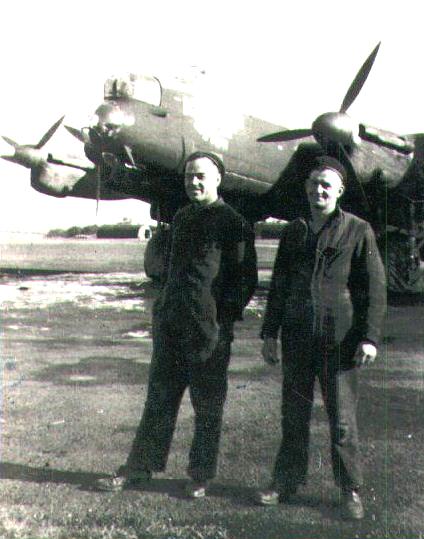
K2 Ground Crew members: Jack (armourer) and Cpl. Jack Hill, Melbourne. (engines)
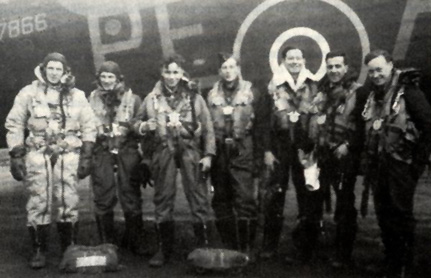
The Crew: Wal Ebbage; Rear Gunner, John Colbert; Mid-Upper Gunner, Ron Holder; Flt. Engineer, Vic Neal; Pilot, Bill Gourlay; Nav, Ron Robinson; W/T Op.
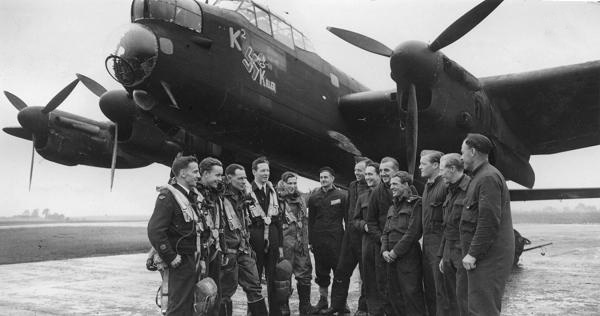
Vic Neale and his crew lined up with K2 Ground Crew. In the middle Cpl Jack Hill, Melbourne, then two unknown, Artie (Shaw?) who flew with Ted Owen's crew to Emmerich, unknown, Sgt. Bill Young Sgt in charge, then two unknown airmen.
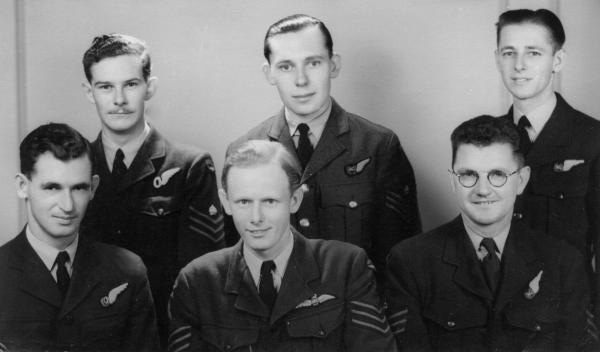
Harry Carter who flew the greatest number of trips in "G" George and his crew L–R Keith Harris, (bomb aimer), Doug Hodge, (MUG), Bob Coveny, (W/Op) Gordon Peters, (Nav), Harry "Cherry" Carter, (Pilot), Gerry Brown, (Tail Gunner).

From left to right, top to bottom: Glen Douglass – Rear Gunner; Jerry Bateman – Pilot, DFC; Jack Thomson – Bomb Aimer; Jack Mckay – Wireless Operator; Col Challis – Mid Upper Gunner; Bert Hemming - Navigator.
Glen Douglass from South Australia died a year or two ago; Jerry Bateman from Broome as a dashing young airman liked to wear his cap at a rakish angle; Jack Thomson was show down with Utz on the disastrous Nuremberg raid in early 1944 when 97 Lancasters were lost. Jack missed six of our operations and joined the Utz crew to finish his 30 Ops - as did my Flight Engineer - both were killed; Jack Mckay survived the war but when caretaker of a bowling club soon after the end of the war was shot and killed by an intruder; Col Challis was from Victoria and died a few years ago; My Navigator was Englishman Bert Hemming and he died a year or two ago also.
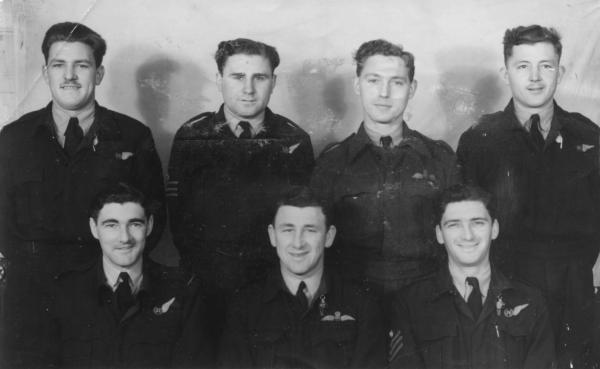
Joe McNamara's crew, L–R: Bill Valance (Tail), Royce Pearce (W/Op), Frank Belfield (Eng.), Jim Tuchen (MUG), Bruce Kelly (Bomb Aimer), Joe McNamara (Pilot), Bob Webb (Nav).
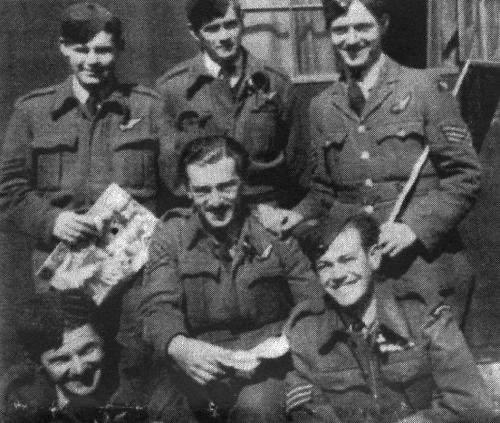
L–R Back row: Bob Duncan (Nav), Jos Trimmer (bomb aimer), Charles "Blue" Roberts (W/Op), Pete Milton (MUG), Bruce Woods (Pilot).
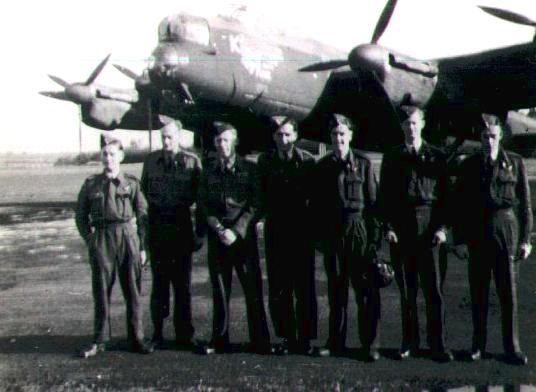
L–R Midge Carr, Dick Moore, Vic Grimmett, (Pilot) Fred Flattery, (KIA) Jack Pogson, Ted Williamson, Jock Fenion.
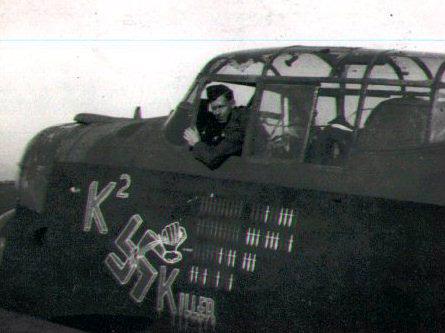
Vic Grimmett in the starting block, ready to go. Bomb tally on the side reveals the many daylight trips K2 was engaged in following on D–Day
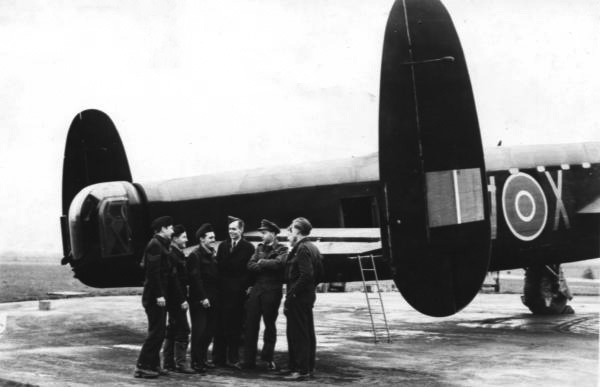
Discussing tactics at the tail end of a Lanc.
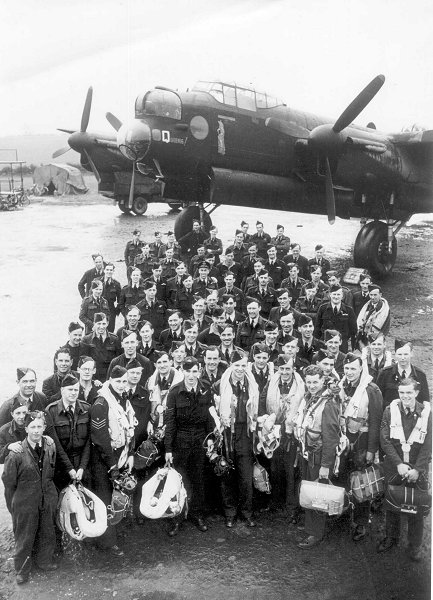
"A" flight crews lined up in front of "Q" Queenie, early 1944.
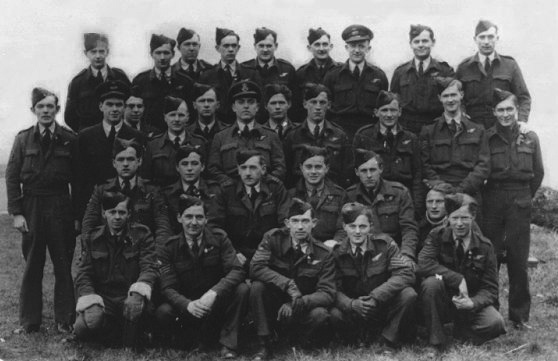
460 Squadron Wireless Operator/Air Gunners, Binbrook early 1945.
Don Cummings to the right of the officer in the middle who is wearing a peak cap was the W/Op in Lomand Luhrs crew and they flew the last operation on Anzac Day 1945 to Hitler's lair at Birtchesgarten. Flying in D2 they were routed in over Lake Constance, Switzerland. The crew marvelled at the scenery in daylight especially Don Cumming who was on his last trip. He had been very unsettled and on tenterhooks as to whether this would be his last trip or not as he was flying with three trips ahead of his crew. As it was 460 squadron last trip it settled all the problems of who finished their tour and who didn't. On the return they flew over and Newcastle at a very low height, trying to identify one of the crew members home, which after some searching they found. When the crew member finally returned home his wife told him about the Lancaster flying extremely low over their house. Thinking somehow if he disclosed the plane's identity he might get the pilot Lomond Luhrs courtmarshalled for low flying he decided to keep his mouth closed. Lomond flying D2 had the honour of being first down at Binbrook on the squadron's last operation, and was very happy as he had raced home as fast as he dared.

Village Inn officer's mess staff.
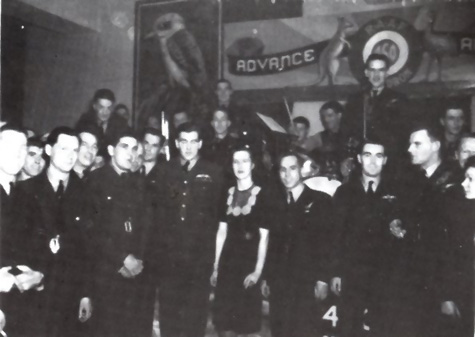
Australia Day 1944, in the Airmen's Mess. Group Captain & Mrs. Edwards in the centre, with F-O. R. Lawton, DFC, F-Lt. C. Gardner, DFC, and F-O T. V. Watts, DFC, the Master of Ceremonies
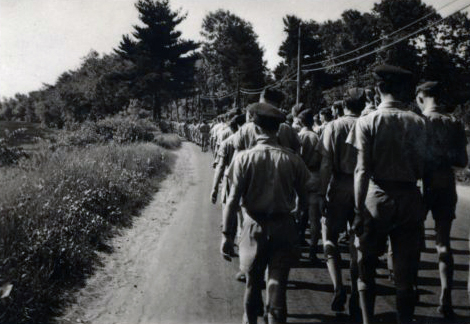
Empire Air training air crews in summer uniform (Curtin's Cowboys as named by the army) in transition at Camp Myles Standish outside Taunton Massachusetts USA May 1943.
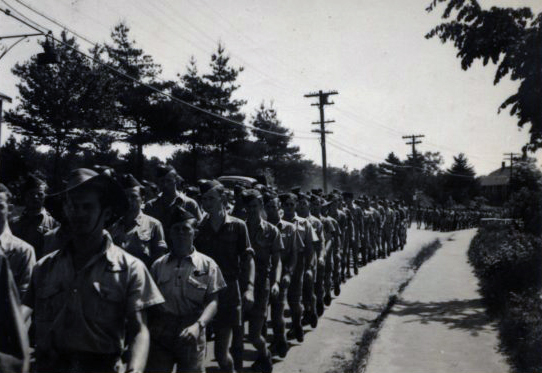
Second left: Laurie Woods.
Back to History
Back to 460 Squadron RAAF Contents



 F-Sgt. L. J. (Mick) Christensen, DFM (middle) and his crew with their aircraft G2 shortly before their last operation which was on Essen, 25th July, 1943, when they crashed on return to base.
F-Sgt. L. J. (Mick) Christensen, DFM (middle) and his crew with their aircraft G2 shortly before their last operation which was on Essen, 25th July, 1943, when they crashed on return to base. K2 Ground Crew members: Jack (armourer) and Cpl. Jack Hill, Melbourne. (engines)
K2 Ground Crew members: Jack (armourer) and Cpl. Jack Hill, Melbourne. (engines) The Crew: Wal Ebbage; Rear Gunner, John Colbert; Mid-Upper Gunner, Ron Holder; Flt. Engineer, Vic Neal; Pilot, Bill Gourlay; Nav, Ron Robinson; W/T Op.
The Crew: Wal Ebbage; Rear Gunner, John Colbert; Mid-Upper Gunner, Ron Holder; Flt. Engineer, Vic Neal; Pilot, Bill Gourlay; Nav, Ron Robinson; W/T Op. Vic Neale and his crew lined up with K2 Ground Crew. In the middle Cpl Jack Hill, Melbourne, then two unknown, Artie (Shaw?) who flew with Ted Owen's crew to Emmerich, unknown, Sgt. Bill Young Sgt in charge, then two unknown airmen.
Vic Neale and his crew lined up with K2 Ground Crew. In the middle Cpl Jack Hill, Melbourne, then two unknown, Artie (Shaw?) who flew with Ted Owen's crew to Emmerich, unknown, Sgt. Bill Young Sgt in charge, then two unknown airmen. Harry Carter who flew the greatest number of trips in "G" George and his crew L–R Keith Harris, (bomb aimer), Doug Hodge, (MUG), Bob Coveny, (W/Op) Gordon Peters, (Nav), Harry "Cherry" Carter, (Pilot), Gerry Brown, (Tail Gunner).
Harry Carter who flew the greatest number of trips in "G" George and his crew L–R Keith Harris, (bomb aimer), Doug Hodge, (MUG), Bob Coveny, (W/Op) Gordon Peters, (Nav), Harry "Cherry" Carter, (Pilot), Gerry Brown, (Tail Gunner).










